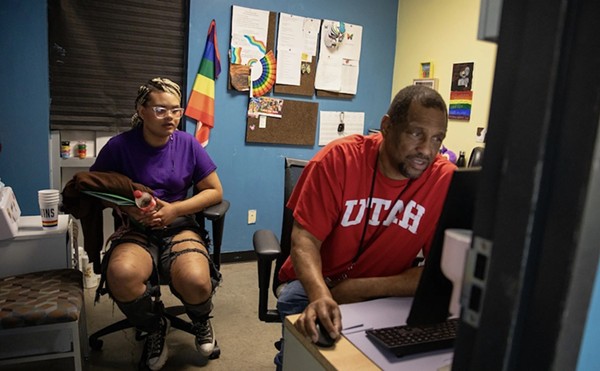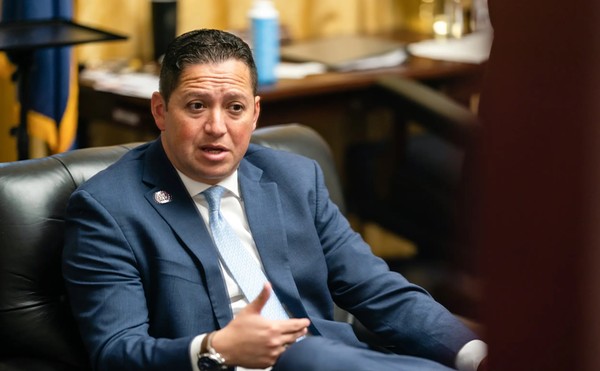“You can actually learn the constancy of curiosity and the constancy of outrage. You can learn that it is okay to keep asking the questions and to be dissenters. And if you don’t, if you’re not taught it, then you don’t know it. But we owe ourselves and the United States that we will pass off to our children, to relearn the tools of reason, logic, clarity, dissent, civility and debate. And those things are the — the nonpartisan basis of democracy. And without them, you can kiss this thing goodbye.” — actor Richard Dreyfuss, on Real Time With Bill Maher November 17.
Dreyfuss’s not-so-impromptu monologue was followed by a plug for the Martha’s Vineyard public-school system, which is hosting a conference December 6 on “the damage done by not teaching civics.” Assuming they can raise a hue and cry over the topic, the district will implement civics classes right away and present them to the nation as a shining, user-friendly monument, with notes — much like a Guggenheim museum, I guess.
Dreyfuss managed to deliver his message with all the hard-to-swallow noblesse oblige of John Kerry on the campaign trail, but that shouldn’t obscure his point. Substantive government classes (not cutesy bits about the Constitutional Congress and the Founding Fathers) are primarily left to college students, the majority of whom squeeze them into their schedule only when they look like the easiest way to pick up a social-sciences credit.
Perhaps not coincidentally, we have a citizenry that is increasingly disengaged from public life (for the purposes of this column, shopping does not count), especially when you consider measurements besides voter turnout. A report released in September by the government-funded National Conference on Citizenship found that key indicators such as trust in others and government, reading newspapers (a more reliable indicator of local community engagement than internet use), and attempting to influence public policy through organizations have declined.
“Government works better and leaders are held more accountable in communities where citizens are actively engaged as citizen experts — writing letters to editors, voting based on informed decision-making, attending public meetings, working on campaigns, or using other ways to strengthen our democracy,” the report frets. The authors are even more disturbed that our historically unprecedented gap between rich and poor is matched by a growing civics chasm: In the 2004 presidential election, voter turnout was up (not as up as in the mid-’70s, but what is?), but the gains were made among the more highly educated and affluent. High-school dropouts, for instance, largely failed to vote. Only 31 percent made it to the polls compared to 62.2 percent of college graduates.
When I began to write this column, I was going to suggest that civics lessons are not enough if parents don’t set the example at home. My father passed away this holiday weekend, and as I was reflecting on the things he had taught me, I realized how much of it was about community and politics. My parents served on the school board (where they managed to make temporary enemies of their friends and children for advocating school uniforms), were precinct chairs and party delegates. My mother was involved for years with the anti-abortion group Minnesota Citizens Concerned for Life, and my dad ran for county office against a man who had held the post unchallenged for several years. He didn’t think he could win, he told us as we stapled silkscreened blue-and-white signs to wooden stakes, but it wasn’t right that no one challenged the incumbent; voters have to have options. Later in life, he became a prolific writer of letters to the editor, in which he represented for Clarence Thomas and criticized the media for paying so much attention to Cindy Sheehan.
While I grew to disagree with most of my folks’ political stances (I’m equally opposed to Catholic-school uniforms and restrictions on women’s reproductive freedom), the underlying value, that we have a responsibility to participate actively in our democratic society, has stayed with me.
But NCOC’s findings mean that the problem can’t be solved with school textbooks or role models alone. “If we continue to have a substantial and growing gap between people coming out of the middle class and people coming out of the lower class, we are going to be in a serious pickle in civic terms,” Harvard public-policy professor Robert D. Putnam told the crowd who gathered for the report’s official release, according to the Washington Post. He went on to speculate that the income-participation gap could be the result of several influences: working parents whose lives are less financially and socially stable, leaving less time for civic involvement; the decline of workers’ organizations such as unions; and a political agenda that is focused around upper-class issues such as tax cuts for the wealthy.
In short, as with most social problems, there is no quick, easy solution to boost civic engagement. Substantial school civics lessons is no doubt a good idea (if kids can dissect fetal pigs, surely they can spend more time at City Hall). Leading by example is always a plus. And in the NCOC’s tables and stats, Democrats might find a reason beyond short-term election gains to pay attention to the poor- and working-man’s blues.


















